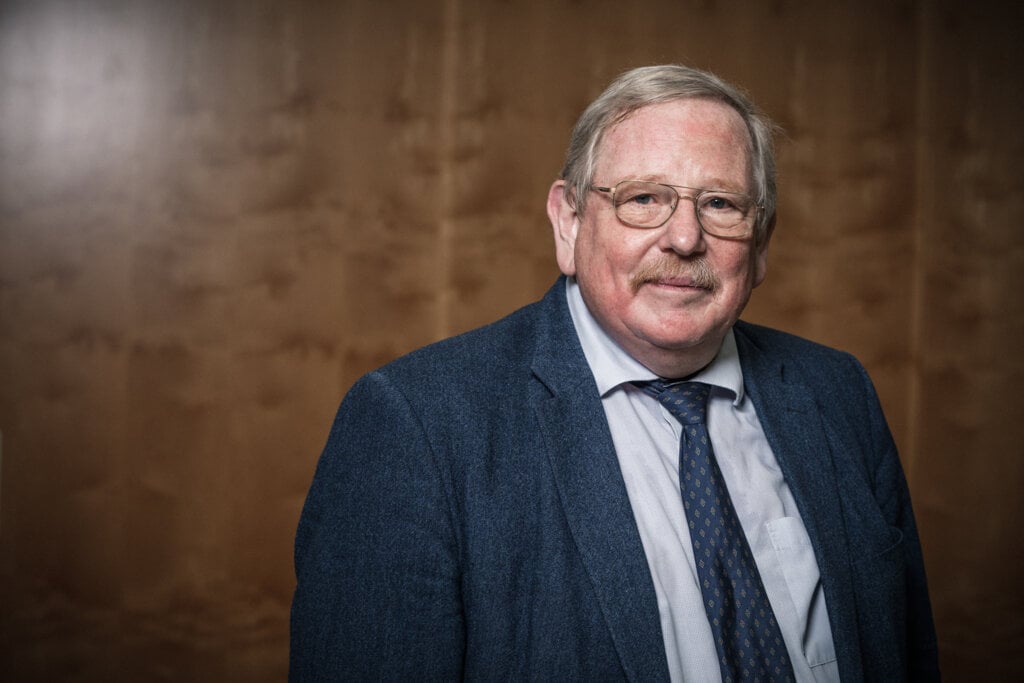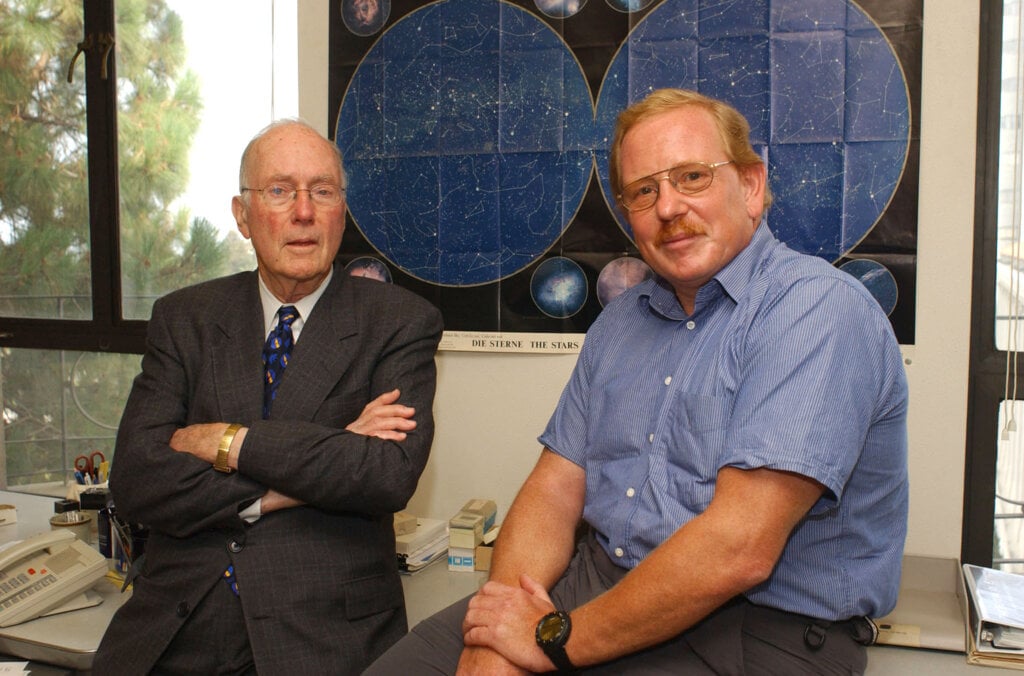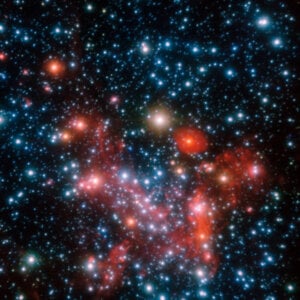Interview with Reinhard Genzel, March 2021
“One day I was playing with the spectrometer and boy, did I get the full 15 kilovolts!”
We spoke to Reinhard Genzel on 9 March 2021. He told us about his childhood interest in science and sports as well as which Nobel Laureate had the biggest impact on his life.
Could you tell us a bit about your childhood? Did you always want to be a scientist?
Reinhard Genzel: Well, let’s see. I started with archeology. I went to, what you call in Germany, a humanistic gymnasium. So nine years of Latin and six years of ancient Greek. Archeology seemed like a fascinating thing. But it became clear, maybe when I was 13 or 14, that the classic period which you read in the books about was more or less done. That’s not true actually, but at least it seemed like that to me. My father is a physicist and was also a director of a Max Planck Institute. So in that sense, I was very close to physics from the beginning and also to experimental physics. As soon as my father discovered that I was interested in experimental stuff we built a laboratory at home. A little bit of chemistry but then later on in our house, up in the attic, I built up a fairly sophisticated optical spectrograph with high voltage sparks so that you could excite molecules and atoms and then measure the light and so forth. So, it was pretty clear that this was an exciting thing and that I would want to study physics.

Professor Reinhard Genzel
Photo credit: Max Planck Institute for Extraterrestrial Physics, Garching
Did you have any accidents with your experiments at home or were they always quite straightforward?
That’s interesting that you ask that! Well, yes, actually. Of course if one is 15, one has friends and wants to show them these kinds of experiments. In one experiment we made bromium hydride. Bromium hydride at room temperature is just between a vapour and a liquid. So if you make the reaction to create that bromide hydride and then you cool it, you get a liquid which you can deal with. It’s extremely corrosive. What I had not realised at the end of the experiment was my cooling apparatus was full of the vapour. So at the end of the experiment, I brought this all into the bathroom to wash up. But I had not realised that I was basically spraying bromium hydride vapour against the walls. Two hours later, my mother came home and already at that time some of the tapestry came down!
So that was the chemistry disaster. The physics disaster – I told you that in order to basically generate a spectrum [from molecules or atoms] you would have a charge device. That’s called a Leiden bottle. So you make a device with an insulator and then you build up charge and then you let that charge go through the spark plug and that generates a 15 kilovolts spark. Of course the entire 15 kilovolts is already at the surface of the bottle. And one day as I was playing around with the spectrometer and then having my hands all over the place, boy, did I get the full 15 kilovolts!
But neither of those were enough to put you off of science?
No, it was fine. Actually I should say most of my time at that age, I spent doing sports. It became very clear, very early on that I was good at throwing things. Initially I did handball and later on I went into track and field. In fact at age 16, which was the last two years of school, I really was very good. I was the best German javelin thrower and I managed to get into the ‘group B’ young future athlete group for the Munich Olympics. So we were training for the Munich Olympics. For the last few years in school, I spent typically three, four hours in every afternoon doing sports. Fortunately I was a good enough student so I could do that. But then, as I started studying physics at university, it was clear either you’re going to go this way or that way.
You mentioned your father but were there any other people that influenced you on the scientific path you took?
Absolutely. In retrospect now, I would say even more than my father, my real mentor of later years was Charlie Townes.
Townes was Nobel Laureate in ’64 in physics – he got his prize for the invention of the maser and the laser. He was then a very influential advisor to the American government for many years and then became provost of MIT. And then all of a sudden he decided he wanted to go back into research and moved across the country to Berkeley, to California, and started doing astronomy. I joined his group as a post-doc and that was just absolutely fantastic. I would say, if you look at the kind of style of research which I’ve been pursuing since that time, I really learned that with Townes.
What was the major lesson that he taught you?
Well, lesson number one is to focus yourself on important questions. Don’t get lost in the forest of arbitrary questions. Focus on one thing or a few things, work hard and see how far you get. And then if you have success and other people start coming along and do the same thing – which is very typical, if you’re successful and many people start imitating – then leave the field. He would always do that. He would always stay in a given field for only a certain length of time. The laser was one of the examples. He did the maser, he wrote a very famous paper about the laser, but never got into laser research much because that was done by industry immediately. Hundreds of people were descending on that field and he said, okay, goodbye, I’m going now. I’ve listened to that advice a number of times where after a while – it’s good enough, let’s go on, let’s do something else. Do challenging things and try hard.

Professor Charles Townes and Professor Reinhard Genzel and in Professor Townes’ office
Photo credit:UC Berkeley Physics Department
What qualities do you think are needed to be a successful scientist?
Well, I think I wouldn’t generalise. I would say it depends on the field. Surely everyone would agree that with the exception of very, very few discoveries, intensity is the most important thing. A burning desire, a concentration. I’m really concentrated on something and I just don’t notice the world anymore. That’s the kind of thing that you need to really focus.
Hard work. I mean, that may not be true for all. It’s possible that we’ll find some examples of extremely successful work, which was done in a more casual way, although Einstein’s general relativity which is supposed to be one of these great strikes of the mind really wasn’t if you look at it. He struggled ten years after the theory of special relativity to get to the general theory. He made many mistakes, his math wasn’t good enough. He had to learn maths from mathematicians and other people were telling him what he was doing wrong. So it’s by no means something that came overnight.
Now there are examples of things that came very quickly. I guess this last 2020 Chemistry Prize, CRISPR, that is more like it. From what I learned from Emmanuelle [Charpentier] it was done in a relatively short period of time, and it was based on a good idea executed fairly rapidly.
What advice would you give to a young person starting in science?
I would say if you really want to become a successful research scientist, you must really want to do it. You have to really be willing to sacrifice. If I look at my successful colleagues overall, then all of these are 150% people, so to speak. They’re really going all the way out to do it.
And of course, luck – you have to be lucky.
And what about mentors?
Now the mentor business, that’s an interesting question. I would maintain that, as I did, having mentors is just absolutely fantastic because they can point you so easily in the right direction if you’re willing to learn.
In the US certainly I would say the idealistic style of research is one where you are independent. I was never independent. I was building independence over the years, but I’m not independent now – I depend on my team. I wouldn’t have done anything without my team.
So I have to really say, you can want to get into a position where you can realise your dreams, maybe that type of independence. But to say, ‘I want to control everything by myself and not depend on other people.’ No, no, no.
You are very passionate about science, but what do you do outside of work in your free time?
I mentioned sports and, while I do not do professional sports, for a long time, until three years ago when I damaged my knee, I was intensely going into the mountains. Here in Europe in the Alps. And then in the United States, where I live two months a year in Berkeley, I go into Sierra Nevada. Mountains are great to hike in and relax for me. I’m not a beach person. My family is, they love to be at the beach. I don’t, I find that boring. But mountains, they’re great. And I mentioned archeology. Archeology you can still see when you come to our house. You’ll find hundreds and hundreds of books. I live in a library!
What is it about the universe and about your work that you enjoy?

The central parts of our Galaxy, the Milky Way, as observed in the near-infrared with the NACO instrument on ESO’s Very Large Telescope. By following the motions of the most central stars over more than 16 years, astronomers were able to determine the mass of the supermassive black hole that lurks there.
Photo: © Max-Planck-Institut für Extraterrestrische Physik, Garching. ESO/S. Gillessen et al.
I tell people the universe and astronomy in particular is a bit like hiking into a new forest you’ve never seen. So you go into the forest, you hike and you enjoy, and you look around, you see the trees, see some flowers. So that’s the first phase is just to enjoy the richness of the universe. That’s what I would call astronomy. That’s not enough for me because, I now have learned [there are] trees and flowers, but I have not understood how this forest works. So the physicist in me, he now sees that the blue flowers are always on the left side of the trail and the red flowers are always on the right side of the trail.
And then of course you go ahead and you start doing experiments, you ask yourself, does it have anything to do with the direction, is it up or down, or how the water’s running? So you’re trying to learn about the universe through asking ever more questions and finding systematic features about something.
Now, the galactic center is a little different from this, but most of our work actually is in this way I just described to you. We are trying to understand how galaxies formed and evolved early in the universe. So that’s 12 billion years ago, about two or three billion years after the Big Bang.
So you’re using astronomy as a time machine because the speed of light is constant. And so as we look out in space with ever bigger telescopes and ever better equipment, we can look and see ever more details of the blue flowers and the red flowers and understand how they work.
This interview has been edited for length and clarity.
First published: March 2021
Nobel Prizes and laureates
Six prizes were awarded for achievements that have conferred the greatest benefit to humankind. The 14 laureates' work and discoveries range from quantum tunnelling to promoting democratic rights.
See them all presented here.
